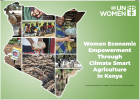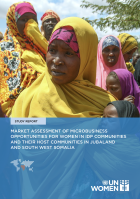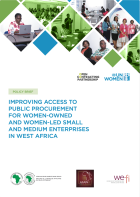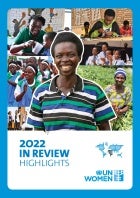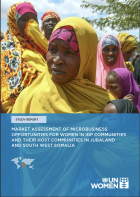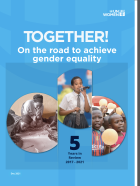1 - 17 of 17 Results
Date:
Discover the key insights and milestones of the Beijing Declaration and Platform for Action (BPfA) as we approach its 30th anniversary in 2025. This publication explores progress made, persistent challenges, and Kenya’s contributions to gender equality. Highlighting actionable steps for individuals and organizations, it connects the BPfA to the Sustainable Development Goals, emphasizing its continued relevance in driving transformative change for women and girls globally.
Date:
The WEE-CSA Storybook showcases the success stories of over 2,400 women from Kitui, Laikipia, and West Pokot who have transformed their lives through climate-smart agriculture. Funded by KOICA and implemented by UN Women Kenya, it highlights the project's impact on livelihoods and gender equality while sharing valuable lessons learned. This collection celebrates resilience and aims to inspire further community upliftment for sustainable development in Kenya.
Date:
Under the leadership of the Ministry of Gender, Child, and Social Welfare, in collaboration with the Ministry of Peace Building, and with support from UN Women and international funding, the Women’s Charter empowers women and girls to engage with the Reconstituted National Constitutional Review Commission (R-NCRC). Launched on May 29, 2024, in Juba, the Charter addresses twelve critical themes, advocating for comprehensive legal, policy, and programmatic interventions in the Permanent Constitution-making process.
Date:
The publication aims to understand the current landscape of microbusiness in terms of the opportunities, barriers and challenges that women in displacement settings face in accessing economic opportunities in the cities of Kismayo, Dollow and Baidoa
Date:
Women own 30 per cent of the small and medium businesses worldwide, yet women-owned businesses only access 1 per cent of all procurement contracts suggesting systemic gender disparities within procurement systems. This policy brief analyses the extent to and ways in which regional institutions in West Africa could adopt better policies for gender-responsive procurement.
Date:
The 2022 in review yearly edition aims at keeping our esteemed readers abreast with the endeavors of the UN Women Rwanda programmatic highlights and achievements throughout the year. It encompasses the period of January through December 2022. Within these pages, we have meticulously curated a selection of activities undertaken by our organization, as well as providing a platform for the voices of those whom we have had the privilege of serving, to be heard. We trust that the contents of this newsletter will prove to be both enlightening and informative. Enjoy the read!
Date:
The policy brief aims to serve as an synthesizes and presents key findings from UN Women-led research; regional online surveys and; advocacy on. making the AfCFTA work for (young) women and (young) women-led businesses, both in the design and implementation of gender-responsive AfCFTA policy reforms and complementary measures, as well as in the soon-to-be negotiated AfCFTA Protocol on Women and Youth in Trade.
Date:
Empowering women in the economy and closing gender gaps in the workspace is key to achieving the 2030 Agenda for Sustainable Development and achieving the Sustainable Development Goals in Somalia. The host community landowners and IDP casual laborers can jointly build their skills in climate-smart agriculture that can benefit the productivity of farms whilst also building the knowledge and skill set of IDPs.
Date:
The five years in review publication captures the progress made from 2017 to 2021 across its different focus areas: Leadership and Political Participation, Women’s Economic Empowerment, Ending Violence Against Women, Data and Statistics, HIV/AIDS and the response to the unfolding crisis caused by the COVID-19 pandemic.
Date:
UN Women amplified women’s role in the COVID-19 response highlighting the significant leadership roles women played in leading the response efforts in materials on COVID-19 prevention disseminated in local languages and hand washing facilities were constructed in 6 elementary schools. 528 returnee migrant women workers from the Middle East and domestic workers across Addis Ababa have been provided with basic sanitation and hygiene training and raising awareness on the disproportionate impact of COVID-19 on women, girls, and vulnerable and marginalized groups.
Date:
This report highlights UN Women Nigeria’s work for the year 2020. The report builds around the Nigeria Country Office programmatic areas of intervention and reflects the achievements attained in collaboration with various government and non-governmental partners who contributed to policy advocacy efforts, delivery of services, implementation, and funding of interventions aimed at promoting gender equality and women’s empowerment. The population at large (men, women, boys...
Date:
The publication aims to provide information that helps prepare the youth for an inclusive, environment sensitive, and resilient approach to productive livelihoods.
Date:
The review indicated that Ethiopia has not only ratified many of the conventions and treaties related to refugees and asylum seekers, but also formalized these laws into its Constitution and in the national Refugee Proclamation. However, a closer analysis of the health sector focusing on sexual, reproductive, maternal, newborn, child and adolescent health (SRMNCAH) services to women and girls in the humanitarian settings, the laws, policies, strategies, guidelines, programs, and plans of the sector indicated a clear gap.
Date:
The African Continental Free Trade Area (AfCFTA) an opportunity for growth and prosperity in Africa. However, because of pre-existing inequalities in African economies, the agreement’s benefits will not be distributed equally along gender lines. As the AfCFTA Secretariat is starting to draft a Women in Trade Protocol, it is important that women across the continent participate actively in the process to voice their views, interests, and needs. This advocacy brief highlights 9 important...
Date:
The rapid assessment publication on Gender and Agricultural Mechanization in Ethiopia provides clear recommendations to inform the agricultural mechanization policy currently under development in the country by adding value to the process through introduction of gender responsiveness approach. The assessment also aims to strengthen enforcement of the existing agricultural mechanization by evaluating current practices in gender and mechanization in the...
Date:
UN Women East and Southern Africa continues to STEP IT UP for gender equality on a daily basis to give voice to women and girls who are still challenged with the violence, injustice, unequal opportunities and prejudices because of their gender.
Date:
In this issue : -Introduction: the gender gap in agricultural productivity -Three takeaways on the gender gap in agricultural productivity -Measuring the cost of the gender gap in agricultural productivity -Costing the factors that contribute to the gender gap in agricultural productivity -Finding the biggest bang for the buck: cost-effective policy interventions -Moving from recommendations to implementation -Appendix A: Methodology for quantifying the cost of the gender gap in...


